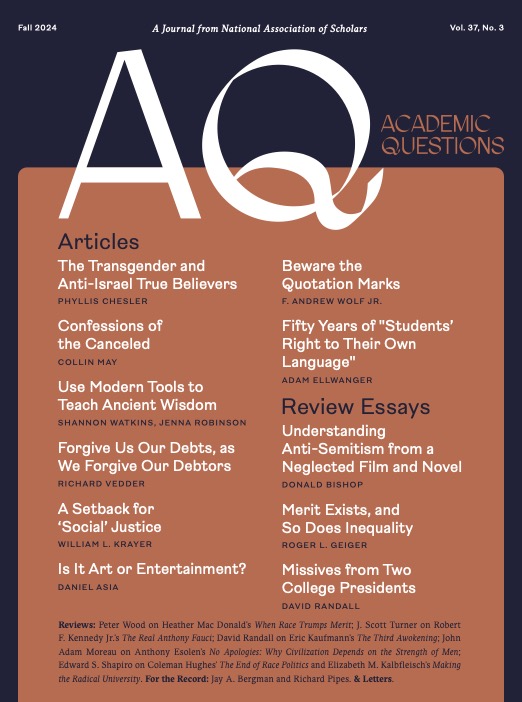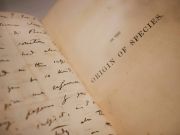No Apologies. Why Civilization Depends on the Strength of Men, Anthony Esolen, 2022, Regnery Gateway, pp. 184, $30.00 hardcover.
Anthony Esolen writes that the interests of men and women are inextricably entwined with one another toward the common good and that the good of men cannot be found apart from women. There is in American culture, says the author, the trashing of the family and the growth of government and bureaucracy intruding on the role of the father.
Noting the widely voiced assertion that there are no major differences between the sexes, which he calls “indifference to sex,” Esolen remarks that among the crucial distinctions is that patriarchy is rightly at the core of a solid culture.
'Think of the hopelessness of the secular world,' he says, 'which has set its face in stubborn self-destruction against the figure of the father…. Patriarchy is built into our nature. Wherever the role of the father is at ebb, liberty languishes, because the engines of government must come in to deal with the chaos that always results.'
That Esolen, a professor, writer, and translator (his Dante translations are the Modern Library Classics series), has written such a provocative book is no surprise to those who admire his essays and his books, among them Life Under Compulsion (2015), Ten Ways to Destroy the Imagination of Your Child (2013), Out of the Ashes: Rebuilding American Culture (2017), and The Politically Incorrect Guide to Western Civilization (2008).
Esolen believes the feminist movement has gotten many things pitiably wrong about men and women. His tone is wry, regretful, worried, and at times has a tincture of anger. He is respectfully in awe of women—their beauty, strengths, nourishing, and fortitude when left behind with children by useless men. Esolen writes: “Men do not look to women for protection. A man looks to a woman for bounty, tenderness, and patient endurance—she is the one to be protected, because she will be the one bearing and caring for his child.”
In an interview with me Esolen said that he appreciates the “bounty” of women, by which he means their “generosity, fruitfulness, the art of giving, which includes the art of making the most of your resources, to give good things to your family and all who visit you.”
There are other books on the topics of masculinity and its relationship to femininity and civilization. Harvey Mansfield’s Manliness (2006) comes to mind, but there are others. Esolen, however, has emerged as perhaps the most important writer on these topics. In our interview when asked what formed his thoughts for the book and why he wrote it, Esolen said:
I have been writing about the issues in the book for years. I know what my college freshmen have been taught to believe about men and women and I know how dispirited the boys often are. They have been given to believe that their sex is responsible for all the evils in the world while being given credit for nothing. That’s a crime, a rotten thing to do to mere children, not to mention a distortion of history.
Here is what Esolen sees when he looks at the assault on fatherhood and the dismissal of it as a key to the solidity of the family, commenting that he “should not have to write these words.” Men are widely held in low esteem by women and by men themselves. Here and elsewhere in the book he tells the reader that he is talking about the general rule. It is, he says, “high time that men be reminded not only that they have powers as men, but also that those powers were given them to be used for the common good—for everyone, men and women and children all.”
It is when he comes to boys that one senses Esolen’s wrath, writing that the care of boys is like “a bit of strychnine in the soup—not enough to kill, but certainly enough to make the diner sick.” Boys, Esolen writes, “are told there is something wrong with them because they are not like girls. They are also told that girls can do all the physical things they can, and perhaps do them better—an absurd falsehood. Telling boys these things is poisonous and I daresay it is intended to be so: those who speak this way want the boys to be weaklings, to despise their own sex, to doubt their natural and healthy inclinations.” Schools, he writes, “are quite simply bad” for boys.
Today, says Esolen, masculine physical strength and strength of character are met with contempt. The word virile has come to mean sexual potency instead of manly self-confidence and competence. He asks of manhood: “Where has it gone?” As the author sees it “men are told it is wrong to withhold emotional expression, iron niceness rules the land,” not moral virtue. If you want to fail to raise boys to be fully men, be sure you deny—as is the present case—millions of boys a married father in the home.
What today’s culture has on offer, says Esolen, is an ocean of shiftless men who cannot find work because they have no valuable skills. Therefore, such working-class men cannot marry young and with confidence. America’s decline into single parenthood continues with its “results of loneliness, incapacity and for many … crime.” The vast majority of males once aged into full manhood by learning to work. Women know that these disheartened and unemployed or underemployed men are “not worth marrying.” Much work takes strength, Esolen writes, but feminism denies the strength of young men or damns it as “toxic masculinity.”
Esolen does not merely state what he says has gone wrong. This book is replete with examples and analogies to make his case. It is a book of nuances and convictions. For example, Esolen believes that,
When patriarchs are missing, what you get from the boys is either aggressive disobedience or underachievement and waste. And then you get unhappy girls who despise the boys they have helped to form. The girls, too, go bad, because the sexes are made for each other, and you cannot corrupt one without corrupting both. If feminism has brought joy to the world, where is it? Where are the mirthful equality and the child-rich families of women liberated from womanhood and men liberated from manhood? Where are the beautiful works of art and music they have produced? Where are the bold and confident people who can take on opponents with grace and laughter? What has civilization gotten from them, besides bumper stickers and T-shirts? If women lead men, where are the happy female bosses—and the joyful men they lead? If feminists are good for boys, where are the boy geniuses fostered by feminists? Why do people in an egalitarian wonderland not sing their love of the sexes?
The opening chapter of No Apologies is entitled “Strength.” Among the vivid examples are the decisions and materials that are involved in raising a barn, constructing a cathedral, or building an aqueduct and the brute strength the laborers had to have, workers who over time as boys built muscle that girls do not have and cannot have. The female would not and could not build an aqueduct. But she benefits in her realm from there being one. Only men, Esolen writes, could have cleared the land in Quebec where thriving farms were the result of grueling labor. The more the land bloomed the more were women adept and successful in managing the home and the children. Quite simply civilization and its cities were built on the strength of men and by a sane hierarchy of paternalism. This chapter is richer in argument than can be relayed here but the core is in this quote:
Nature never meant for women to wrestle hogs or work on pile drivers or hang from the mast of a ship. The man’s strength is for the common good, and in particular for the women and children.
In the chapter titled “Agency,” Esolen discusses what he sees as the male’s instinct to do, seek, find, build, and the ways that men are aggressive. Esolen likes the term used by a psychologist, Ellen Winner, “rage to master,” which is a “consuming and obsessive interest in what fascinates.” This is markedly true, he says, of those men who are outliers—Edison “strangely indifferent to society” and sleeping on his lab table and absorbed in his work seventeen or eighteen hours a day; Jerry Lucas, a star basketball player who had in his memory all the statistics of every player in every game he played; or Alexander Alekhine, a chess master who played twenty-six games blindfolded, winning sixteen, losing five. The rage is inward, says Esolen, and it is fortunate when it is given encouragement and scope.
A chapter that is far more elaborate than might be assumed from the title “Team” presents the theme that the things men do are intimately tied to men working together either now or by standing on the shoulders of others—in politics, education, the sciences, and business. Women organize themselves differently from the way men do. Rarely, Esolen comments, do females play pickup games. Males do so all the time.
Other chapters—"The Family,” “The Vision,” “The Father in Heaven”—are just as rewarding. Therein he writes of envy being the “spiritual poison for feminists.” “Feminist scholars have discovered no neglected female Chaucer, so they must tear the actual Chaucer down and make sure that nobody else learns from him.”
Esolen makes other points worth considering: If you do not have patriarchy you have moral, intellectual, and civic anarchy; the “universality of the father-headed family [is the] absolute necessity for human survival”; the innocence of children is “betrayed at every pass”; when “fathers go absent, do not expect women to take their place. That is not possible.”
Also in these other chapters, as throughout the book, the reader finds Esolen acerbic regarding education. “The school,” the author writes, “run not by your neighborhoods but by the juggernauts of the teachers’ unions, the publishers of textbooks, and the ideologues of the programs that teach the teachers, is not in the business of helping boys to become men and the heads of strong families.”
The aptness of the words “no apologies” in the title of Esolen’s book is borne out by what he has to say throughout the book. The subtitle tells the reader of the case he intends to make. His assertions are hard and serious. But it is likely the reader will be pleasantly surprised that No Apologies is a thing of easy and congenial prose and of welcome erudition. There are forty-seven quotes and references and each is just right. If you stack them in alphabetical order you run from Henry Adams and Archimedes down to Issac Newton and Larry R. Vandervert, a physiologist.
The reader is also likely to be rewarded by the places Esolen takes him. The balk rule in baseball, which penalizes a team when a pitcher makes a pick-off throw with his foot in the wrong place. Dante and Beatrice. The team of under sixteen-year-old boys who beat the Australian World Cup women’s team 7-2. Todd Beamer, the “Let’s roll!” hero of the 9/11 hijacked flight, who called a telephone operator because he wanted to spare his pregnant wife such shattering, shocking news live and who with the operator recited Psalm 23. Bill James, the baseball statistics guru. Natalie MacMaster, a Celtic fiddler. The Volstead Act. Andrew Wiles, who went from a kid math genius to at age thirty-nine publishing a proof which “shook the mathematical world.” Jacob Grimm of the Brothers Grimm. The worst sin of Ebenezer Scrooge. Mozart supposedly composing while playing billiards. The philosopher Thales falling into a ditch while looking at the stars. Thomas Aquinas, a fat schoolboy being called the Dumb Ox.
Such strokes on Esolen’s canvas help make for a distinctive work. The author, however, presents no program or opinions about what can be done to address our afflictions. “Not to worry,” he told this reviewer. “That is for another book.”
Those who disagree with Esolen and find him off-base can say, “Aha! Gotch ya!” Those who admire Esolen and believe he speaks common sense can say, “Wow! Right book at the right time!”
John Adam Moreau, a history Ph.D. from the University of Virginia, has been a longtime reporter and editor for major daily newspapers; [email protected]. He is the author of Randolph Bourne, Legend and Reality (Public Affairs, 1966) and of published essays on such subjects as Huey Long, Francisco de Miranda, and Heywood Broun. He last appeared in AQ in winter 2023 with “American History Done Right,” a review of Wight Martindale Jr.’s American History from the Beginning to 1876: A Home School Guide (2023)
Photo by Svetavi on Adobe Stock














